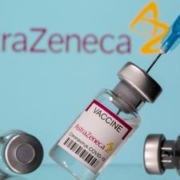The University of Oxford is testing the anti-parasitic drug ivermectin as a possible treatment for Covid-19, as part of a British government-backed study that aims to aid recoveries in non-hospital settings.
A sense of urgency, powerful science, relentless ingenuity, hope and trust drove the development of Pfizer and BioNTech’s mRNA vaccine during the height of the Covid-19 pandemic. As the crisis appears to lessen, Pfizer is preparing for the next pandemic.
The Russian health ministry’s ethical committee declined to approve clinical trials in Russia combining a British shot from AstraZeneca and Oxford University with Russia’s Sputnik V vaccine, an AstraZeneca official told Reuters on May 28.
Two doses of the Oxford/AstraZeneca Covid-19 vaccine are around 85 percent to 90 percent effective against symptomatic disease, Public Health England (PHE) said on May 20, citing an analysis of real-world data from the rollout of the shot.
The Covid-19 vaccine of AstraZeneca Plc and Oxford University works well as a third booster dose, stepping up antibodies to the coronavirus spike protein among participants in a study, the Financial Times said on May 19.
The same group at the University of Oxford and the Jenner Institute that developed the AstraZeneca-Oxford Covid-19 vaccine reported that their investigational malaria vaccine, R21/Matrix-M, demonstrated 77 percent efficacy in children over 12 months of follow-up.
There is a much higher risk of brain blood clots from Covid-19 infection than there is from vaccines against the disease, British researchers said on April 15, after the rollout of inoculations was disrupted by reports of rare clots.
Six months after a Covid-19 diagnosis, more than 33 percent of people exhibited some form of brain damage, according to a study appearing in Lancet Psychiatry.
Oxford, U.K.-based Vaccitech reportedly filed confidentially in the United States for an initial public offering (IPO) on the Nasdaq.
The United States may not need AstraZeneca’s Covid-19 vaccine, even if it wins U.S. regulatory approval, Anthony Fauci, the nation’s top infectious disease doctor told Reuters on April 1.










